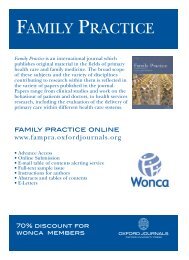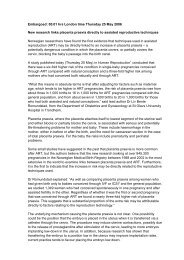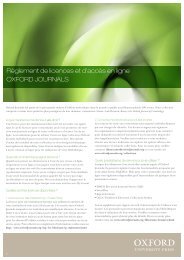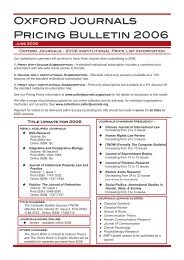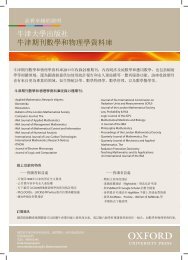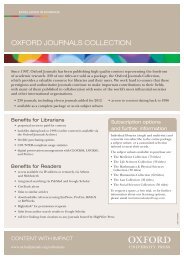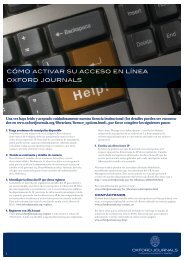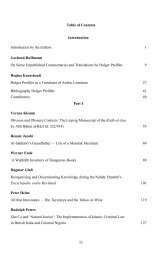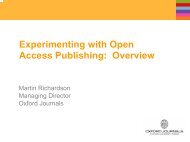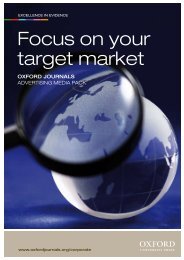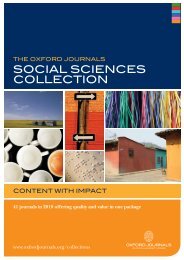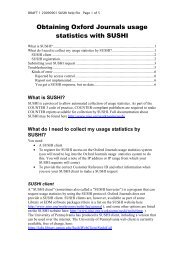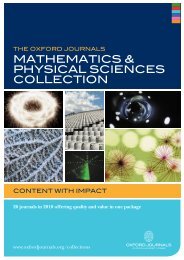Download the ESMO 2012 Abstract Book - Oxford Journals
Download the ESMO 2012 Abstract Book - Oxford Journals
Download the ESMO 2012 Abstract Book - Oxford Journals
Create successful ePaper yourself
Turn your PDF publications into a flip-book with our unique Google optimized e-Paper software.
1262P DISTINCT SPREAD OF EGFR MUTATED PULMONARY<br />
ADENOCARCINOMAS<br />
D. Shin 1 , S.Y. Kwon 2 , C.H. Kim 1 , S.H. Yang 1 , I.I. Na 1<br />
1 Internal Medicine, Korea Cancer Center Hospital, Korea Institute of Radiological<br />
and Medical Sciences, Seoul, KOREA, 2 Hospice and Palliative Care Team, Korea<br />
Cancer Center Hospital, Korea Institute of Radiological and Medical Sciences,<br />
Seoul, KOREA<br />
Introduction: Our aim in this study was to explore <strong>the</strong> potential association of<br />
epidermal growth factor receptor (EGFR) with characteristics of tumor spread in<br />
patients with pulmonary adenocarcinoma. Clinical implication of EGFR mutational<br />
status on brain metastasis was also evaluated in surgically treated patients.<br />
Methods: We analyzed clinical data on 317 patients who were tested for EGFR<br />
mutation and who underwent brain MRI at diagnosis between October 2005 and<br />
December 2011. The relationship between EGFR mutation status and clinical factors<br />
were analyzed. Initial metastatic disease was stratified according to brain metastases<br />
and <strong>the</strong>ir association with EGFR mutations was evaluated using multinomial logistic<br />
regression.<br />
Results: Of <strong>the</strong> 317 patients, 139 patients (43.85%) harbored EGFR mutations. EGFR<br />
mutations was more commonly found in patients with early nodal stage (71.9 %<br />
versus 28.1%, adjusted odds ratio [OR] = 1.90, p = 0.030) and distant metastases<br />
(54.0% versus 46.0%, adjusted OR = 2.05, p = 0.011). Fur<strong>the</strong>r analysis showed that<br />
EGFR mutations were more likely to be detected in brain metastases (64.7% versus<br />
35.3%, p = 0.005), whereas <strong>the</strong>ir association with noncranial metastases was not<br />
significant (55.4% versus 44.6%, p = 0.960). In addition, survival analysis of 133<br />
patients treated with surgical resection showed that EGFR mutation status was a poor<br />
prognostic factor for brain metastasis (HR = 5.94, 95% CI = 1.08-16.28, p = 0.039)<br />
after adjustment of pathologic N stage.<br />
Conclusions: In this study, EGFR mutation status was significantly associated with<br />
early nodal and distant metastasis, in <strong>the</strong> patients with pulmonary adenocarcinoma.<br />
The current study also suggests <strong>the</strong> preference of brain metastases in mutant EGFR<br />
tumors at initial presentation and after curative resection.<br />
Disclosure: All authors have declared no conflicts of interest.<br />
1263P IMPACT OF EPIDERMAL GROWTH FACTOR<br />
RECEPTOR-TYROSINE KINASE INHIBITOR TREATMENT IN<br />
ADVANCED NON-SMALL CELL LUNG CANCER: A<br />
META-ANALYSIS<br />
C.K. Lee 1 , C. Brown 2 , R. Gralla 3 , V. Hirsh 4 , A. Inoue 5 , V. Gebski 6 , C.J. Yang 7<br />
1 NHMRC Clinical Trials Centre, University of Sydney, Sydney, NSW, AUSTRALIA,<br />
2 Clinical Trials, NHMRC Clinical Trials Centre, University of Sydney, Sydney,<br />
AUSTRALIA, 3 Department of Medicine, Hofstra University School of Medicine,<br />
New York, UNITED STATES OF AMERICA, 4 Oncology, McGill University Health<br />
Centre, Montreal, QC, CANADA, 5 Department of Respiratory Medicine, Tohoku<br />
University, Sendai, JAPAN, 6 Biostatistics and Research Methodology, NHMRC<br />
Clinical Trials Centre, University of Sydney, Sydney, AUSTRALIA, 7 Department of<br />
Oncology, National Taiwan University Hospital, Taipei, TAIWAN<br />
Background: Previous meta-analyses have reported that epidermal growth factor<br />
receptor (EGFR)-tyrosine kinase inhibitor (TKI) improves progression-free<br />
survival (PFS) in patients with advanced non-small cell lung cancer (NSCLC)<br />
harbouring EGFR mutation. We examined <strong>the</strong> influence of EGFR-TKI on PFS<br />
and overall survival (OS) in those with (EGFR+) and without mutation<br />
(EGFR-).<br />
Methods: We included published and unpublished randomised trials of advanced<br />
NSCLC that compared EGFR-TKI mono<strong>the</strong>rapy or combination EGFR-TKI<br />
chemo<strong>the</strong>rapy with chemo<strong>the</strong>rapy or placebo. We used published hazard ratios (HR)<br />
if available, or derived treatment estimates from o<strong>the</strong>r survival data. We investigated<br />
treatment effects in different treatment settings and trial regimens.<br />
Results: We identified 20 eligible trials investigating EGFR-TKI in front-line (n = 12),<br />
second or subsequent (n = 5), and maintenance (n = 3) treatment, with EGFR status<br />
known in 3198 (23%) patients. Overall, HR for EGFR-TKI over control for PFS were<br />
(EGFR+) 0.37 (95% CI, 0.32 to 0.42; p < 0.001) and (EGFR-) 1.02 (95% CI, 0.93 to<br />
1.12; p = 0.67). EGFR mutation is predictive of PFS benefit with EGFR-TKI in all<br />
settings: front-line HR (EGFR+) 0.39, p < 0.005, HR (EGFR-) 1.07, p = 0.27,<br />
interaction p < 0.001; second or subsequent lines HR (EGFR+) 0.38, p = 0.01, HR<br />
(EGFR-) 1.22, p = 0.07, interaction P = 0.003; maintenance HR (EGFR+) 0.15, p <<br />
0.001, HR (EGFR-) 0.81, p = 0.02, interaction p = 0.02. There was no difference in OS<br />
for patients treated with EGFR-TKI or control in <strong>the</strong>se subgroups of patients: HR<br />
(EGFR+) 0.95, p = 0.21; HR (EGFR-) 0.95; p = 0.29.<br />
Conclusions: In this meta-analysis, treatment with EGFR-TKI was found to<br />
significantly delay disease progression in EGFR+ patients; however, no impact on<br />
OS was identified. EGFR mutation is a predictive biomarker of PFS benefit<br />
with EGFR-TKI treatment in all settings. These findings support assessment for<br />
Annals of Oncology<br />
EGFR mutation before initiation of EGFR-TKI treatment and that EGFR-TKI<br />
should be considered as front-line <strong>the</strong>rapy in EGFR+ patients with advanced<br />
NSCLC.<br />
Disclosure: R. Gralla: Consultant or advisory role for Boehringer Ingelheim. V.<br />
Hirsh: Advisory role for Boehringer Ingelheim. A. Inoue: Received lecture fees and<br />
research grants from AstraZeneca. C.J. Yang: Advisory roles for Boehringer<br />
Ingelheim, AstraZeneca, Roche and OSI, and have received honoraria from<br />
AstraZeneca, Roche and OSI. All o<strong>the</strong>r authors have declared no conflicts of<br />
interest.<br />
1264P CLINICOPATHOLOGIC FEATURES OF NEVER-SMOKING<br />
WOMEN LUNG CANCER (WLC): A REVIEW FROM THE<br />
SPANISH WORLD07 DATABASE<br />
J. De Castro 1 , D. Isla Casado 2 , M. Provencio Pulla 3 , M. Majem Tarruella 4 ,<br />
N. Vinolas Segarra 5 , E. Felip 6 , A. Artal-Cortes 7 , R. García-Campelo 8 ,<br />
M. Domine 9 , P. Garrido Lopez 10<br />
1 Medical Oncology, Hospital Universitario La Paz, Madrid, SPAIN, 2 Oncology<br />
Service, Hospital Clínico Universitario Lozano Blesa, Zaragoza, SPAIN, 3 Medical<br />
Oncology, Hospital Universitario Puerta de Hierro Majadahond, Majadahonda,<br />
SPAIN, 4 Medical Oncology, Hospital de la Santa Creu i Sant Pau, Barcelona,<br />
SPAIN, 5 Medical Oncology, Hospital Clinic y Provincial de Barcelona, Barcelona,<br />
SPAIN, 6 Oncologia Médica, Vall d’Hebron University Hospital Institut<br />
d’Oncologia, Barcelona, SPAIN, 7 Servicio de Oncologia Medica, Hospital Miguel<br />
Servet, Zaragoza, SPAIN, 8 Medical Oncology, Complexo Hospitalario<br />
Universitario de A Coruña, La Coruña, SPAIN, 9 Oncology, Fundación Jiménez<br />
Díaz, Madrid, SPAIN, 10 Medical Oncology, Hospital Ramon y Cajal, Madrid,<br />
SPAIN<br />
Background: Lung cancer in never-smoker appears to be a distinct entity from lung<br />
cancer in smoker, with specific molecular characteristics and potential different<br />
treatment. Several factors like hormonal, environmental, genetic, pre-existing lung<br />
diseases, and virus, may play etiologic roles, and an in-depth understanding of <strong>the</strong>m<br />
is needed. So, new clinicopathologic aspects of never-smoking WLC should be very<br />
important to know <strong>the</strong> biology of this tumoral disease.<br />
Methods: Information has been extracted from WORLD07 database, a prospective,<br />
from 32 Spanish centers, epidemiologic female-specific lung cancer e-database<br />
performed by ICAPEM, an association to research WLC.<br />
Results: From October 2007 to October 2011, 539 newly diagnosed never-smoking<br />
WLC were included in World07 database (39.3% of 1371 patients(p). P<br />
characteristics are: median age 71.1 years(y) (range: 22-91). Previous history of<br />
cancer (%): 13(breast, lung, cervix: 41.4,5.7,2.9). Gynecological features: median age<br />
of menarche 13y, Postmenopausal 88.9%, median age of menopause 49y. Median age<br />
of first child 26.4y Children: 91.2% (median: 2.3). Oral contraceptive: 11.9%. HRT:<br />
5.2%. Tobacco exposure: Second-hand smokers: 40%, work-exposure 17.1%,<br />
home-exposure 88.8%. Obesity: 16.3%. Familiar history of cancer: 39.9% (lung cancer<br />
29.8%).Lung cancer histology (%): adenocarcinoma/BAC/squamous/large cell/SCLC/<br />
o<strong>the</strong>rs: 69.2/6.8/5.7/5.0/3.8/3.8. EGFR mutated p (268 p analized): 55.5%, exon 19/<br />
20/21(%): 61.1/7.4/36.9. TNM NSCLC I/II/III/IV (%): 14/3.3/19.8/60.3. Treatment:<br />
EGFR-TKI in p harboring EGFR mutations stage IV (1 st -/2 nd -line)(%): 51.7/15.4;<br />
stage IV NSCLC(1 st -line)(%): platinum-based chemo<strong>the</strong>rapy 42.5, combinations with<br />
bevacizumab 2.9. Overall survival: median 27 months (m), 1/2-y(%) 74.8/55.2; stage<br />
IV NSCLC: median 20.5m, 1/2-y(%) 67/46; EGFR mutated p: median 27.3m, 1/2-y<br />
(%) 75/54.3.<br />
Conclusions: Never-smoking WLC represents 39% of Spanish World07 database.<br />
The high incidence of adenocarcinoma histology (69.2%) and EGFR mutated tumors<br />
suggests a different clinical and genetic profiling and recommend a different<br />
treatment approach for this group of patients.<br />
Disclosure: All authors have declared no conflicts of interest.<br />
1265P IS THERE A BENEFIT ON SURVIVAL OF TYROSINE-KINASE<br />
INHIBITORS VERSUS CHEMOTHERAPY IN FIRST LINE IN<br />
MUTATED EGFR PATIENTS WITH ADVANCED NON-SMALL<br />
CELL CANCER (NSCLC)? A META-ANALYSIS<br />
G. Des Guetz 1 , B. Uzzan 2 , K. Chouahnia 1 , P. Nicolas 2 , L. Zelek 1 , M. Pailler 1 ,<br />
J. Morère 1<br />
1 Oncology, Hôpital Avicenne, Bobigny, FRANCE, 2 Pharmacology, Hôpital<br />
Avicenne, Bobigny, FRANCE<br />
Background: Tyrosine-Kinase Inhibitors (TKIs) markedly improve Progression<br />
Free Survival (PFS) of advanced NSCLC patients mutated for Epidermal Growth<br />
Factor Receptor (EGFR). Results on Overall Survival (OS) are more questionable.<br />
Therefore, we performed a publication-based meta-analysis to fur<strong>the</strong>r assess this<br />
issue.<br />
ix414 | <strong>Abstract</strong>s Volume 23 | Supplement 9 | September <strong>2012</strong>



